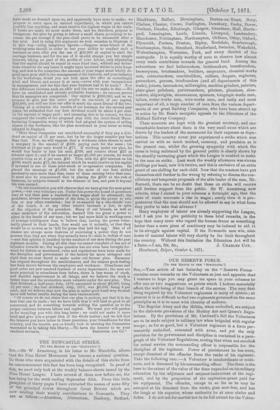THE NEWCASTLE STRIKE.
(To THE EDITOR OF THE uSPEOTATOR.1 Sin,—Sir W. Armstrong, in his letter to Mr. Mundella, allows that the Nine Hours' Movement has become a national question. To those who were acquainted with the details of this strike from its commencement this fact has been long recognized. In proof of this, we need only look at the weekly balance-sheets issued by the Nine Hours' League. I have several of them now before me, the last being for the week ending September 26th. From this little pamphlet of thirty pages I have extracted the names of some fifty of the principal towns throughout Great Britain which are now sending their weekly contributions to Newcastle. They are as follows :—Aberdeen, Altrincham, Banbury, Bedford,
Blackburn, Belfast, Birmingham, Burton-on-Trent, Bury, Chelsea, Chester, Crewe, Darlington, Dewsbury, Derby, Dover,.
Durham, Dundee, Edinburgh, Glasgow, Grantham, Hull, Hartle- pool, Leamington, Leeds, Lincoln, Liverpool, Londondery, Manchester, Nottingham, Northampton, Oldham, Otley, Oxford,.
Plymouth, ]fortsea, Preston, Ripley, Rochdale, Scarborough,
Southampton, Stoke, Stratford, Sunderland, Swindon, Wakefield,. Wolverhampton, Worcester, York, and every district of the
metropolis. It is equally worthy of note to observe how almost every trade contributes towards the general fund. Among the subscribers we find boilermakers, bottlemakers, brassfounders, brewerymen, brualamakers, builders, carpenters, chemical-works men, cabinetmakers, coachbuilders, colliers, drapers, engineers, gunmakers, grocers, ironfounders (and all departments of this trade), joiners, lacemakers, millwrights, machine grinders, painters,
plate-glass polishers, patternmakers, printers, plumbers, shoe- makers, shipwrights, stonemasons, spinners, telegraph-works men,.
tailors, water-works men, wire-works men, and lastly and most important of all, a large number of men from the various depart- menta of our great Railway Companies, who have been stirred up to action by Mr. Bass's energetic appeals to the Directors of the. Midland Railway Company.
These accounts are kept with the greatest accuracy, and ono remarkable feature about them is the very small sums which are drawn by the leaders of the movement for their expenses as depu-
tations. This country never yet experienced a strike which was, carried on with so much method, economy, and precision as in
the present one, whilst the growing sympathy with which the
cause is being embraced by the general public is clearly shown by the steadily increasing grant which the League is enabled to make,
to the men on strike. Last week the weekly allowance wos eleven, shillings per head, now it is twelve, and this is exclusive of an extra grant of one shilling for each child. Now that the masters have put themselves still further in the wrong by refusing to discuss the con-
ciliatory and temporate proposals of the able leader of the men, Mr.. Burnett, there can be no doubt that those on strike will receive still further support from the public. Sir W. Armstrong now admits, what I stated in your columns a fortnight ago, that the elate of trade warrants a rise in wages ; surely then it is pro- posterous that the men should not be allowed to say in what form; they prefer to take that advance ?
Many employers of labour are already supporting the League, and I ask you to give publicity to these brief remarks, in the hope that many more who regard the human frame as something better than a mere piece of machinery may be induced to aid it in its struggle against capital. If the Newcastle men win, nine hours of manual labour will very shortly be the limit throughout; the country. Without this limitation the Education Act will be a farce.—I am, Sir, &c., J. CLIARLES COX. Hazelwood, Belper, October 4, 1871.


































 Previous page
Previous page